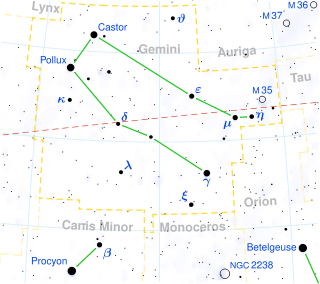Chi2 Orionis

| |
| Observation data Epoch J2000.0 Equinox J2000.0 (ICRS) | |
|---|---|
| Constellation | Orion |
| Right ascension | 06h 03m 55.18482s[1] |
| Declination | +20° 08′ 18.4316″[1] |
| Apparent magnitude (V) | 4.63[2][3] |
| Characteristics | |
| Spectral type | B2Ia[2] |
| U−B color index | −0.68[3] |
| B−V color index | +0.28[3] |
| R−I color index | +0.22[3] |
| Variable type | α Cyg[4] |
| Astrometry | |
| Radial velocity (Rv) | 16.8 ± 0.9[5] km/s |
| Proper motion (μ) | RA: 1.88[1] mas/yr Dec.: −2.10[1] mas/yr |
| Parallax (π) | 1.81 ± 0.28[1] mas |
| Distance | approx. 1,800 ly (approx. 550 pc) |
| Absolute magnitude (MV) | -7.6[2] |
| Details | |
| Mass | 42.3 ± 1.0[6] M☉ |
| Radius | 61.9[2] R☉ |
| Luminosity | 446,000[2] L☉ |
| Surface gravity (log g) | 2.35[2] cgs |
| Temperature | 19,000[2] K |
| Rotational velocity (v sin i) | 72[2] km/s |
| Age | 5 ± 0.6[6] Myr |
| Other designations | |
| Database references | |
| SIMBAD | data |
Chi2 Orionis (Chi2 Ori / χ2 Orionis / χ2 Ori) is a B-type supergiant star in the constellation of Orion. It has an apparent visual magnitude of 4.63. Since 1943, the spectrum of this star has served as one of the stable anchor points by which other stars are classified.
Chi1 Orionis is an unrelated yellow main sequence star over two degrees away.
Spectrum
χ2 Orionis has a B2 bright supergiant spectrum and is one of the standard B2 Ia stars.[7] It has been reported as having unusually narrow absorption lines and some weak emission lines and was included as one of the original Be stars.[8] It is no longer treated as a Be star since many supergiants show some emission features at high resolution and Be stars is usually defined to exclude supergiants.[9]
Variability
χ2 Orionis was listed as a likely small amplitude variable star based on photometry for the Third Catalogue of Stars measured in the Geneva Observatory Photometric System. The amplitude was measured as 22 thousandths of a magnitude.[10] It was included in the General Catalogue of Variable Stars based on Hipparcos satellite photometry with a magnitude range (in the Hipparchos photometric system) of 4.68 - 4.72 and a period of 2.8 days.[11] A detailed study of the Hipparcos photometry confirmed the star as an α Cyg variable and gave the amplitude of variation as 0.057 magnitudes.[12]
References
- 1 2 3 4 5 van Leeuwen, F. (November 2007). "Validation of the new Hipparcos reduction". Astronomy and Astrophysics. 474 (2): 653–664. arXiv:0708.1752
 . Bibcode:2007A&A...474..653V. doi:10.1051/0004-6361:20078357.
. Bibcode:2007A&A...474..653V. doi:10.1051/0004-6361:20078357. - 1 2 3 4 5 6 7 8 Crowther, P. A.; Lennon, D. J.; Walborn, N. R. (2006). "Physical parameters and wind properties of galactic early B supergiants". Astronomy and Astrophysics. 446: 279–293. arXiv:astro-ph/0509436
 . Bibcode:2006A&A...446..279C. doi:10.1051/0004-6361:20053685.
. Bibcode:2006A&A...446..279C. doi:10.1051/0004-6361:20053685. - 1 2 3 4 HR 2135, database entry, The Bright Star Catalogue, 5th Revised Ed. (Preliminary Version), D. Hoffleit and W. H. Warren, Jr., CDS ID V/50. Accessed on line January 14, 2011.
- ↑ khi 2 Ori, database entry, The combined table of GCVS Vols I-III and NL 67-78 with improved coordinates, General Catalogue of Variable Stars, Sternberg Astronomical Institute, Moscow, Russia. Accessed on line January 14, 2011.
- ↑ Wilson, Ralph Elmer (1953). General catalogue of stellar radial velocities. Carnegie Institution of Washington. Bibcode:1953GCRV..C......0W.
- 1 2 Tetzlaff, N.; Neuhäuser, R.; Hohle, M. M. (2011). "A catalogue of young runaway Hipparcos stars within 3 kpc from the Sun". Monthly Notices of the Royal Astronomical Society. 410: 190–200. arXiv:1007.4883
 . Bibcode:2011MNRAS.410..190T. doi:10.1111/j.1365-2966.2010.17434.x.
. Bibcode:2011MNRAS.410..190T. doi:10.1111/j.1365-2966.2010.17434.x. - ↑ Garrison, R. F. (December 1993), "Anchor Points for the MK System of Spectral Classification", Bulletin of the American Astronomical Society, 25: 1319, Bibcode:1993AAS...183.1710G, retrieved 2012-02-04
- ↑ Merrill, P. W.; Humason, M. L.; Burwell, C. G. (1925). "Discovery and Observations of Stars of Class Be". Astrophysical Journal. 61: 389. Bibcode:1925ApJ....61..389M. doi:10.1086/142899.
- ↑ Andrillat, Y.; Jaschek, M.; Jaschek, C. (1994). "A study of Be stars in the wavelength region around Paschen 7". Astronomy and Astrophysics Supplement Series. 103. Bibcode:1994A&AS..103..135A.
- ↑ Rufener, F.; Bartholdi, P. (1982). "List of 333 variable, microvariable or suspected variable stars detected in the Geneva photometry". Astronomy and Astrophysics Supplement Series. 48: 503. Bibcode:1982A&AS...48..503R.
- ↑ Kazarovets, E. V.; Samus, N. N.; Durlevich, O. V.; Frolov, M. S.; Antipin, S. V.; Kireeva, N. N.; Pastukhova, E. N. (1999). "The 74th Special Name-list of Variable Stars". Information Bulletin on Variable Stars. 4659: 1. Bibcode:1999IBVS.4659....1K.
- ↑ Lefèvre, L.; Marchenko, S. V.; Moffat, A. F. J.; Acker, A. (2009). "A systematic study of variability among OB-stars based on HIPPARCOS photometry". Astronomy and Astrophysics. 507 (2): 1141. Bibcode:2009A&A...507.1141L. doi:10.1051/0004-6361/200912304.